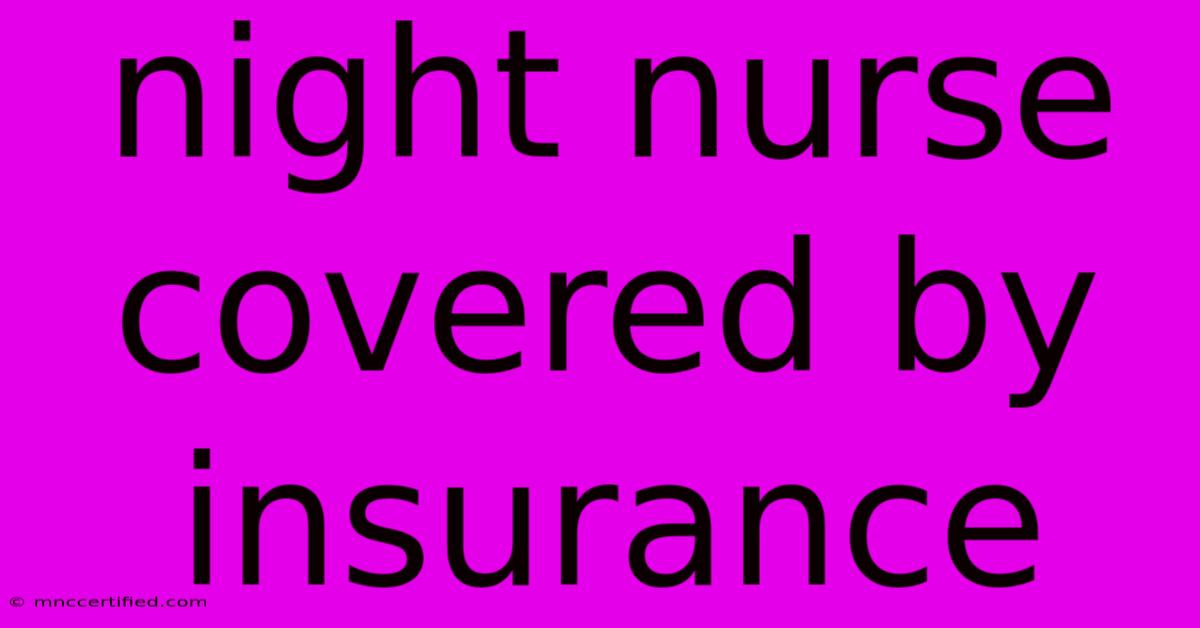Night Nurse Covered By Insurance

Table of Contents
Is Night Nurse Covered by Insurance? A Comprehensive Guide
Navigating the world of health insurance can be confusing, especially when it comes to over-the-counter (OTC) medications like Night Nurse. Many wonder, "Is Night Nurse covered by my insurance?" The simple answer is: usually, no. However, there are some important nuances to consider. This guide will break down the complexities and offer strategies to manage the cost of this popular cold and flu remedy.
Understanding Insurance Coverage for Medications
Most health insurance plans primarily cover prescription medications, not OTC products. This is because prescription drugs require a doctor's diagnosis and are often more potent and require stricter monitoring. Night Nurse, being an OTC medication, falls outside this typical coverage. Your insurance company considers it a personal expense, similar to buying groceries or toiletries.
Why Night Nurse Isn't Typically Covered
Several factors contribute to the lack of insurance coverage for Night Nurse:
- OTC Status: As mentioned, its over-the-counter availability means it doesn't require a prescription, a key factor in insurance coverage decisions.
- Cost-Effectiveness: Insurers aim to manage costs. Including OTC medications like Night Nurse in coverage would significantly increase premiums for everyone.
- Availability: Night Nurse is readily available at pharmacies without needing a prescription, making insurance coverage less necessary.
Strategies to Manage the Cost of Night Nurse
Even without direct insurance coverage, there are ways to reduce the financial burden of purchasing Night Nurse:
1. Explore Flexible Spending Accounts (FSAs) and Health Savings Accounts (HSAs)
FSAs and HSAs allow you to set aside pre-tax money to pay for eligible medical expenses, including some OTC medications. Check your FSA or HSA plan details to see if Night Nurse or similar cold and flu remedies are included. Keep your receipts as proof of purchase for reimbursement.
2. Consider Generic Alternatives
Night Nurse contains paracetamol (acetaminophen) and often other ingredients like diphenhydramine (an antihistamine). You can often find cheaper generic versions of these individual components at your local pharmacy. This approach can significantly reduce the overall cost.
3. Shop Around for the Best Prices
Pharmacies often vary in their pricing. Comparing prices at different stores, both online and in-person, can lead to significant savings. Utilize pharmacy comparison websites or apps to find the best deals.
4. Look for Manufacturer Coupons or Rebates
Pharmaceutical companies sometimes offer coupons or rebates on their products. Check the Night Nurse packaging or the manufacturer's website for potential savings opportunities.
When to Seek Medical Attention and Potential Insurance Coverage
While Night Nurse can provide temporary relief, it's crucial to understand its limitations. If your symptoms worsen, persist for an extended period, or involve serious complications, seek immediate medical attention. In such cases, the treatment prescribed by a doctor might be covered by your insurance, depending on your plan.
Conclusion
While insurance typically doesn't cover Night Nurse directly, proactive financial planning and strategic purchasing can help manage its cost. Understanding your insurance plan details, exploring FSA/HSA options, and utilizing cost-saving strategies are key to responsible self-care. Remember, always prioritize your health, and consult a healthcare professional if your symptoms are severe or persistent.

Thank you for visiting our website wich cover about Night Nurse Covered By Insurance. We hope the information provided has been useful to you. Feel free to contact us if you have any questions or need further assistance. See you next time and dont miss to bookmark.
Featured Posts
-
Erie Insurance Christiansburg Va
Nov 21, 2024
-
Clinton Reflects On Oslo With Crystal
Nov 21, 2024
-
Chad Murray Dance Discovery In Merry Gentlemen
Nov 21, 2024
-
Nba Rescinds Westbrooks Technical
Nov 21, 2024
-
Penn State Outreach Impact Map
Nov 21, 2024